CAT Exam > CAT Notes > Verbal Ability & Reading Comprehension (VARC) > Word List - 9
Word List - 9 | Verbal Ability & Reading Comprehension (VARC) - CAT PDF Download
The CAT is one of the most highly competitive exam that requires extensive preparation and practice. In order to ace the CAT, one needs to be familiar with the key concepts, words and phrases used in the exam. To help you in this preparation, we have compiled a comprehensive list of words and phrases commonly used in the CAT exam. In addition to building strong vocabulary, it will also give you a better understanding of the level of language tested in the exam.
So, let's get started!
Level 1
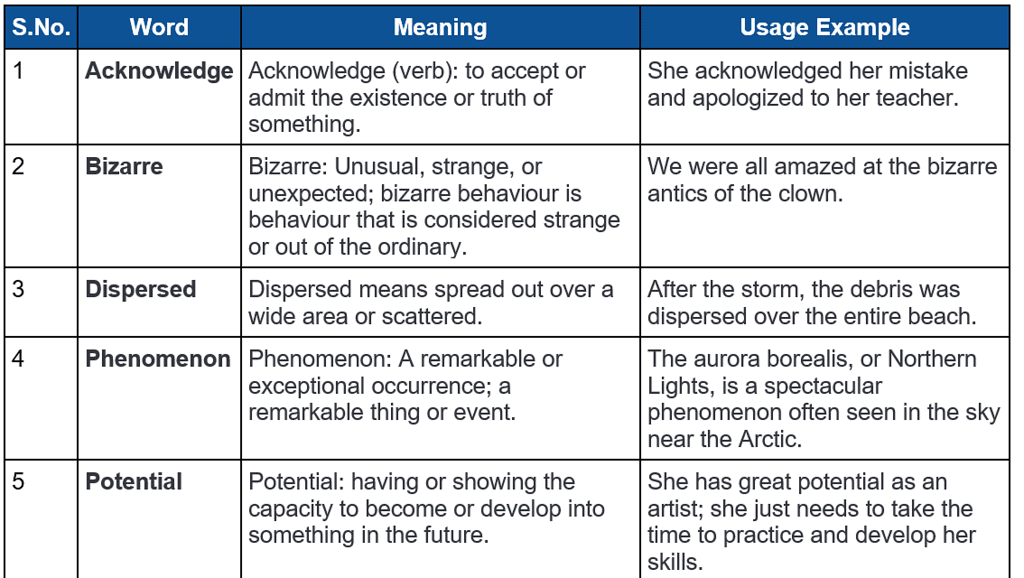

Level 2
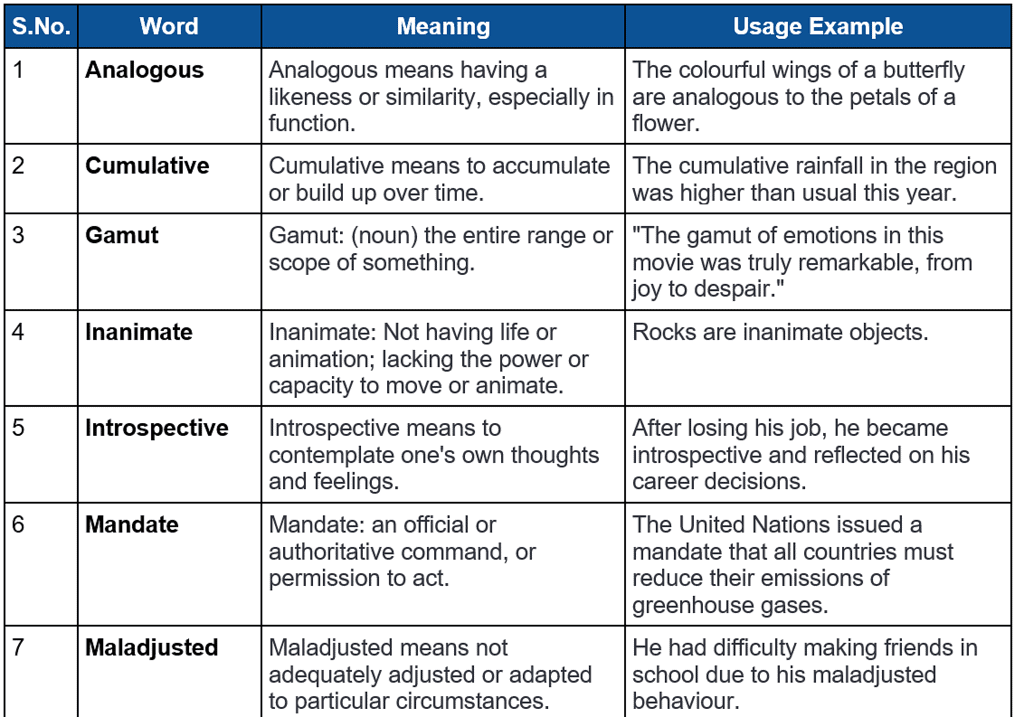
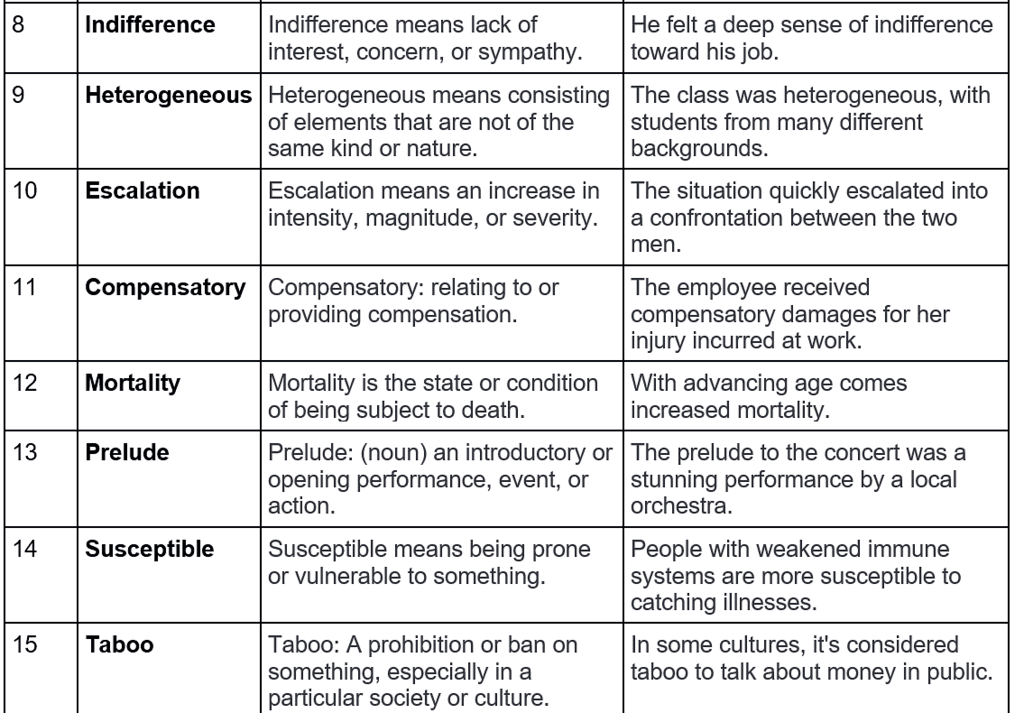

Level 3
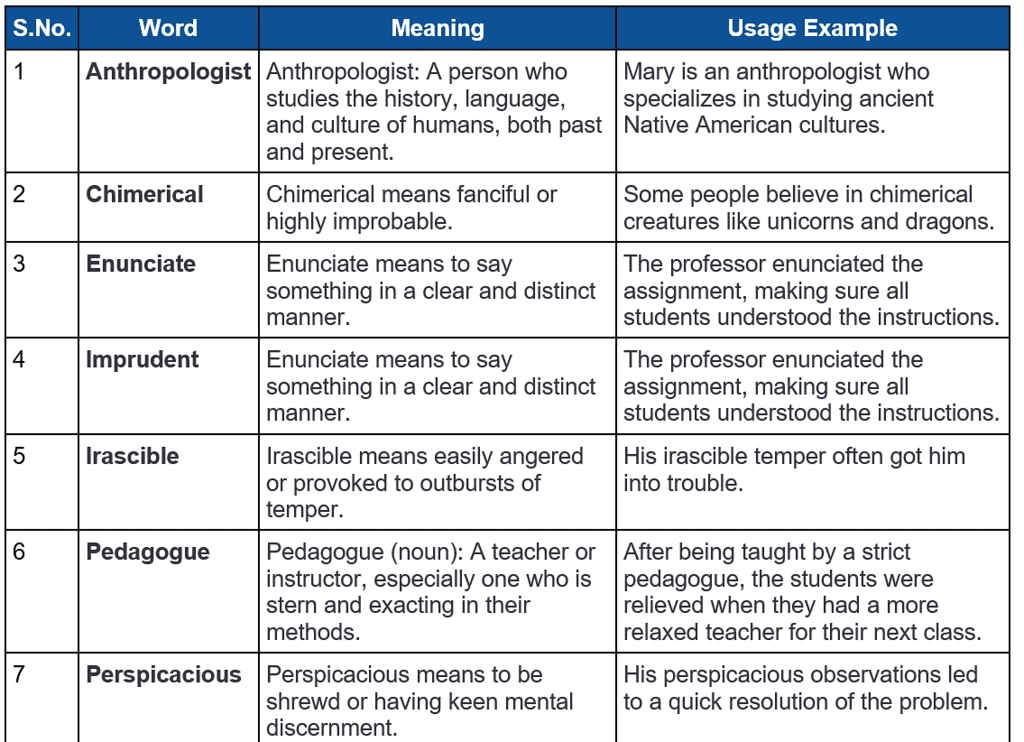
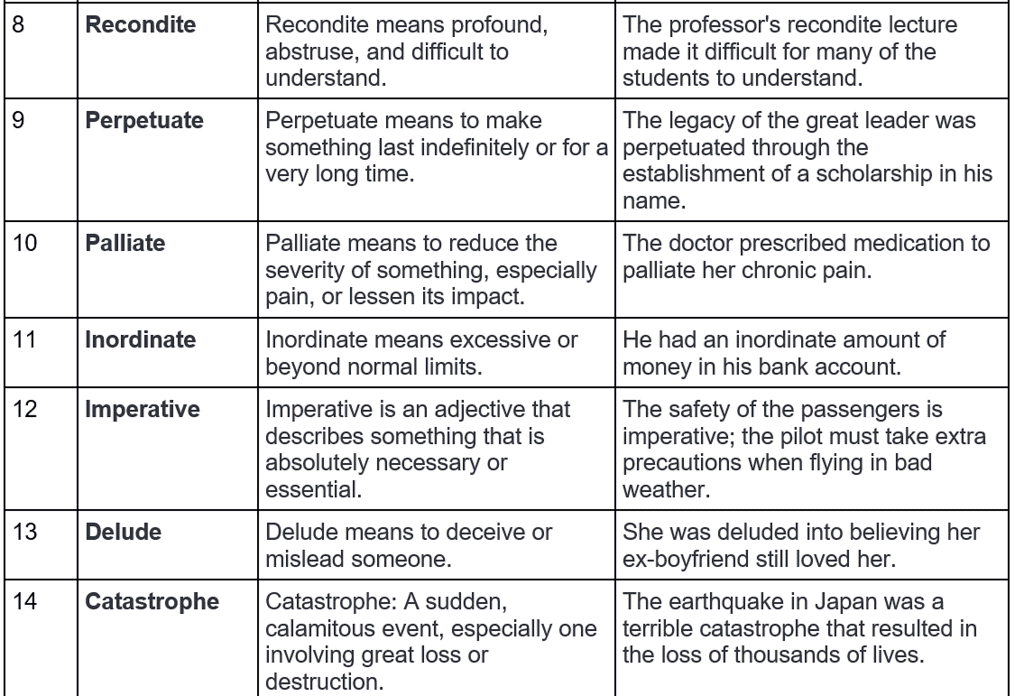

Level 1
Acknowledge
- Acknowledge (verb): to accept or admit the existence or truth of something.
- Example: She acknowledged her mistake and apologized to her teacher.
Bizarre
- Bizarre: Unusual, strange, or unexpected; bizarre behavior is behavior that is considered strange or out of the ordinary.
- Example: We were all amazed at the bizarre antics of the clown.
Dispersed
- Dispersed means spread out over a wide area or scattered.
- Example: After the storm, the debris was dispersed over the entire beach.
Phenomenon
- Phenomenon: A remarkable or exceptional occurrence; a remarkable thing or event.
- Example: The aurora borealis, or Northern Lights, is a spectacular phenomenon often seen in the sky near the Arctic.
Potential
- Potential: having or showing the capacity to become or develop into something in the future.
- Example: She has great potential as an artist; she just needs to take the time to practice and develop her skills.
Artefact
- Artifact: an object made by a human being, typically an item of cultural or historical interest.
- Example: The ancient Egyptian artifacts discovered in the tomb of Tutankhamun are now on display in a museum.
Decade
- Decade: noun; a period of ten years.
- Example: The past decade has been a momentous one for science and technology.
Neutralize
- Neutralizing means to make something ineffective or nullify it.
- Example: To neutralize the effects of an acid, you can add a base to it.
Level 2
Analogous
- Analogous means having a likeness or similarity, especially in function.
- Example: The colorful wings of a butterfly are analogous to the petals of a flower.
Cumulative
- Cumulative means to accumulate or build up over time.
- Example: The cumulative rainfall in the region was higher than usual this year.
Gamut
- Gamut: (noun) the entire range or scope of something.
- Example: "The gamut of emotions in this movie was truly remarkable, from joy to despair."
Inanimate
- Inanimate: Not having life or animation; lacking the power or capacity to move or animate.
- Example: Rocks are inanimate objects.
Introspective
- Introspective means to contemplate one's own thoughts and feelings.
- Example: After losing his job, he became introspective and reflected on his career decisions.
Mandate
- Mandate: an official or authoritative command, or permission to act.
- Example: The United Nations issued a mandate that all countries must reduce their emissions of greenhouse gases.
Maladjusted
- Maladjusted means not adequately adjusted or adapted to particular circumstances.
- Example: He had difficulty making friends in school due to his maladjusted behavior.
Indifference
- Indifference means lack of interest, concern, or sympathy.
- Example: He felt a deep sense of indifference toward his job.
Heterogeneous
- Heterogeneous means consisting of elements that are not of the same kind or nature.
- Example: The class was heterogeneous, with students from many different backgrounds.
Escalation
- Escalation means an increase in intensity, magnitude, or severity.
- Example: The situation quickly escalated into a confrontation between the two men.
Compensatory
- Compensatory: relating to or providing compensation.
- Example: The employee received compensatory damages for her injury incurred at work.
Mortality
- Mortality is the state or condition of being subject to death.
- Example: With advancing age comes increased mortality.
Prelude
- Prelude: (noun) an introductory or opening performance, event, or action.
- Example: The prelude to the concert was a stunning performance by a local orchestra.
Susceptible
- Susceptible means being prone or vulnerable to something.
- Example: People with weakened immune systems are more susceptible to catching illnesses.
Taboo
- Taboo: A prohibition or ban on something, especially in a particular society or culture.
- Example: In some cultures, it's considered taboo to talk about money in public.
Prohibition
- Prohibition is the legal act of forbidding something, usually the sale or consumption of alcohol.
- Example: During the era of Prohibition in the United States, the sale and consumption of alcohol was illegal.
Neurotic
- Prohibition is a legal or social restriction on a particular activity or behavior, often related to the consumption of alcohol.
- Example: The 18th Amendment to the US Constitution was a prohibition on the manufacture, sale, and transportation of alcoholic beverages.
Level 3
Anthropologist
- Anthropologist: A person who studies the history, language, and culture of humans, both past and present.
- Example: Mary is an anthropologist who specializes in studying ancient Native American cultures.
Chimerical
- Chimerical means fanciful or highly improbable.
- Example: Some people believe in chimerical creatures like unicorns and dragons.
Enunciate
- Enunciate means to say something in a clear and distinct manner.
- Example: The professor enunciated the assignment, making sure all students understood the instructions.
Imprudent
- Enunciate means to say something in a clear and distinct manner.
- Example: The professor enunciated the assignment, making sure all students understood the instructions.
Irascible
- Irascible means easily angered or provoked to outbursts of temper.
- Example: His irascible temper often got him into trouble.
Pedagogue
- Pedagogue (noun): A teacher or instructor, especially one who is stern and exacting in their methods.
- Example: After being taught by a strict pedagogue, the students were relieved when they had a more relaxed teacher for their next class.
Perspicacious
- Perspicacious means to be shrewd or having keen mental discernment.
- Example: His perspicacious observations led to a quick resolution of the problem.
Recondite
- Recondite means profound, abstruse, and difficult to understand.
- Example: The professor's recondite lecture made it difficult for many of the students to understand.
Perpetuate
- Perpetuate means to make something last indefinitely or for a very long time.
- Example: The legacy of the great leader was perpetuated through the establishment of a scholarship in his name.
Palliate
- Palliate means to reduce the severity of something, especially pain, or lessen its impact.
- Example: The doctor prescribed medication to palliate her chronic pain.
Inordinate
- Inordinate means excessive or beyond normal limits.
- Example: He had an inordinate amount of money in his bank account.
Imperative
- Imperative is an adjective that describes something that is absolutely necessary or essential.
- Example: The safety of the passengers is imperative; the pilot must take extra precautions when flying in bad weather.
Delude
- Delude means to deceive or mislead someone.
- Example: She was deluded into believing her ex-boyfriend still loved her.
Catastrophe
- Catastrophe: A sudden, calamitous event, especially one involving great loss or destruction.
- Example: The earthquake in Japan was a terrible catastrophe that resulted in the loss of thousands of lives.
Fetish
- Fetish: an excessive and irrational devotion or commitment to something.
- Example: He had a fetish for collecting rare coins.
The document Word List - 9 | Verbal Ability & Reading Comprehension (VARC) - CAT is a part of the CAT Course Verbal Ability & Reading Comprehension (VARC).
All you need of CAT at this link: CAT
|
111 videos|452 docs|90 tests
|
Related Searches
















